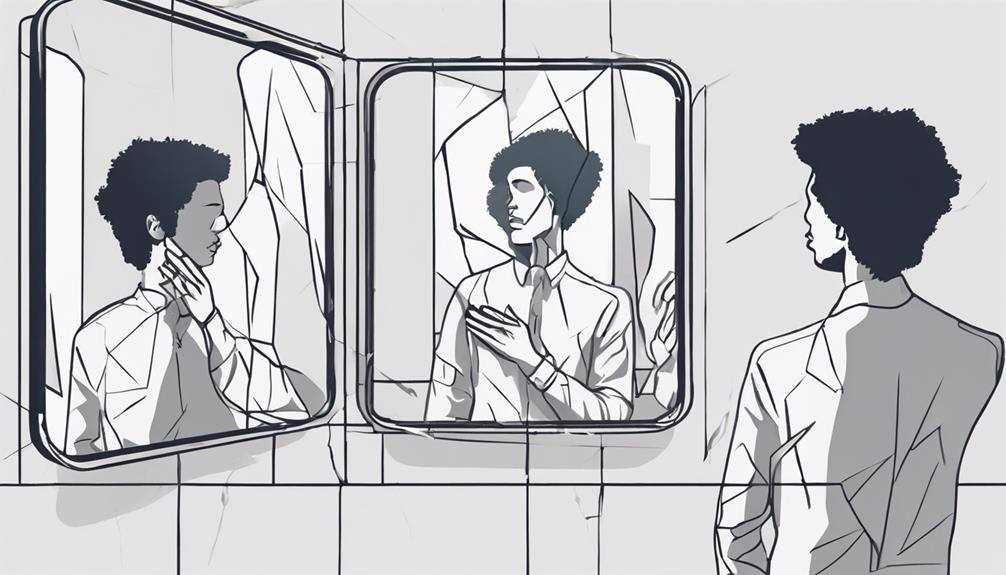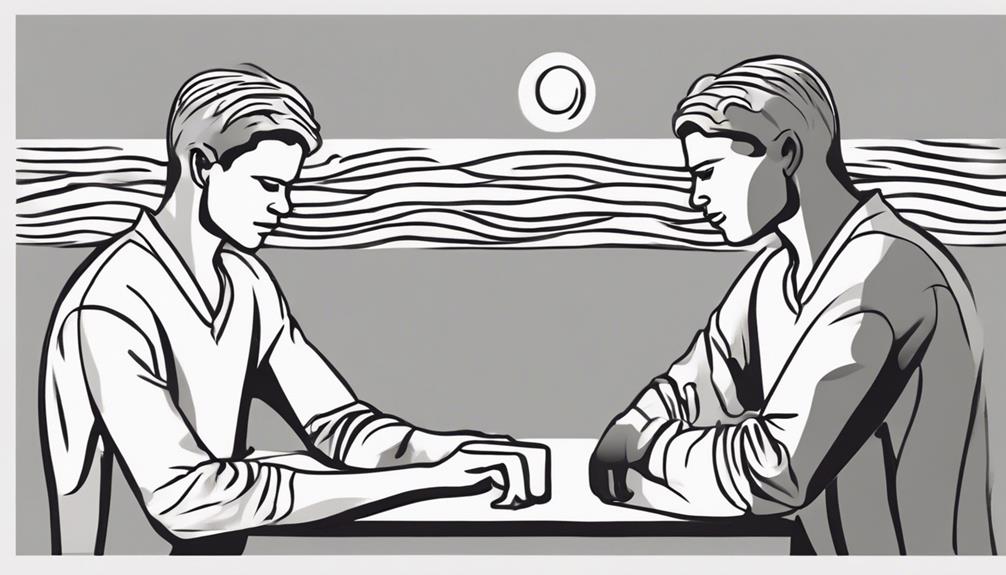Transforming past mistakes into self-improvement is totally doable! Regret serves as a spark for growth, making you reflect on slip-ups, leading to valuable lessons and personal evolution. Embracing change turns oops moments into chances to better yourself. Coping with regrets involves seeking support, practicing mindfulness, and being kind to yourself. Regret becomes a powerful motivator for positive shifts, guiding you towards resilience and growth. By being empathetic towards imperfections and practicing self-compassion, you pave the way for personal development. Start this journey of self-improvement and watch yourself grow into a better version of you!
Key Takeaways
- Acknowledge past mistakes without self-judgment.
- Reflect on lessons learned to avoid similar errors.
- Use regret as a catalyst for personal growth.
- Embrace change by setting achievable goals.
- Cultivate self-compassion to heal and move forward.
Regret as a Catalyst
Regret, serving as a powerful catalyst for self-improvement, prompts individuals to reflect on past mistakes and motivates them to reassess their choices and behaviors. When you confront regrets head-on, you open the door to personal growth and positive transformation.
Embracing regret as a catalyst can lead to the cultivation of resilience and problem-solving skills, shaping you into a more adaptable and proactive individual. By acknowledging your missteps and learning from them, you pave the way for a brighter future filled with better decisions and improved outcomes.
Looking back at moments tinged with regret may not always be easy, but it's through these reflections that you gain valuable insights and lessons. Each regretful experience becomes a stepping stone toward personal development, helping you evolve and mature.
Instead of dwelling on what could have been, use regret as a tool to propel yourself forward, armed with newfound wisdom and determination. In this way, regret transforms from a source of pain into a beacon of growth and empowerment.
Lessons in Mistakes

Mistakes serve as valuable teachers, offering you vital lessons in self-awareness and personal growth.
Reflecting on past mistakes allows you to gain insights into your decision-making processes. By analyzing the root causes of these errors, you can prevent similar mishaps in the future.
It's natural to feel regret when looking back at past mistakes, but it's essential to shift your perspective and see them as opportunities for growth, resilience, and learning.
Embracing Change

Embracing change is a fundamental aspect of turning past mistakes into opportunities for personal growth and self-improvement. Change isn't just about acknowledging the need for improvement but also taking action to make those adjustments in your life.
It's about using the emotion that comes from reflecting on past mistakes to fuel your determination to evolve and become a better version of yourself.
When you embrace change, you open yourself up to new possibilities and ways of thinking. It allows you to break free from old patterns and habits that may have led to regrets in the past. By adopting a mindset that's open to change, you can actively seek out opportunities for learning and growth.
Coping and Healing

Seeking assistance from trusted individuals can help in processing feelings of regret and promoting healing when progressing through challenging times. It's crucial to recognize that past experiences can stir up a whirlwind of negative emotions, making it vital to have a strong support system in place.
Engaging in mindfulness practices can be a powerful tool in managing the stress and overwhelming emotions that often accompany regret. By staying present and accepting these feelings without judgment, you can begin the journey towards healing.
Additionally, practicing self-compassion is a valuable coping strategy when dealing with regretful experiences. Treating yourself with kindness and understanding can help soothe the pain caused by past mistakes.
Regret as Motivation

Regret can be a powerful driving force towards personal growth and positive change. When you acknowledge your feelings of regret and use them as motivation, you open the door to transformative possibilities.
Studies have shown that regret can light a fire within you, propelling you towards making beneficial changes in your life. By embracing regret as a catalyst for action, you can set meaningful goals and work towards achieving them with newfound determination.
Harnessing regret as motivation not only pushes you towards self-improvement but also fosters increased self-awareness and resilience. It's like turning a negative emotion into a powerful tool for personal development.
When you use feelings of regret to fuel your actions, you take control of your narrative and steer it towards growth and positive change. So, next time you find yourself grappling with regret, remember that it can be the spark that ignites your journey towards a better version of yourself.
Identity and Regret

Ever felt like regret has a starring role in the movie of your life? Well, you're not alone. Understanding how regret influences your identity can be the doorway to personal growth and self-improvement.
Regret's Role in Identity
Reflecting on past regrets can greatly influence how you perceive yourself and shape your sense of identity. The way you use regret to navigate your life story and values plays a crucial role in defining who you are. By accepting regrets as part of your journey, you can gain a deeper understanding of your true self and what you hold dear. Integrating regret into your personal growth narrative allows you to transform it into a catalyst for positive change, fostering authenticity and self-acceptance.
—
| Regret's Role in Identity | ||
|---|---|---|
| Regret shapes narratives and self-perception | ||
| Accepting regret leads to deeper self-understanding | ||
| Regret integrated into personal growth narratives | ||
| Embracing regret fosters authentic self-expression | ||
| Regret prompts examination of values for self-improvement |
Embracing Personal Growth
Embracing personal growth involves acknowledging the role that past experiences, both positive and negative, play in shaping your identity and self-development. When you look back and think about the moments of regret in your life, you have a unique opportunity to learn and grow.
Taking action to embrace personal growth means accepting those regrets as part of your journey, allowing them to shape you into a stronger, more self-aware individual. By integrating regret into your narrative, you can deepen your understanding of yourself and your values, ultimately leading to positive change.
It's essential to recognize that regret isn't a dead-end but rather a stepping stone towards self-improvement. When you embrace personal growth, you transform past mistakes into valuable lessons that propel you forward. So, don't shy away from your regrets; instead, use them as fuel to drive your personal development journey.
The Power of Self-Compassion

Let's chat about the incredible power of self-compassion.
Embracing imperfections with empathy is like giving yourself a warm, understanding hug.
Compassion Fosters Growth
Practicing self-compassion is a powerful catalyst for personal growth and positive adjustment in the face of regrets. When regret can lead you down a path of self-criticism and stagnation, self-compassion offers a different route—one paved with understanding and kindness towards oneself.
Research has shown that embracing self-compassion not only aids in accepting past mistakes but also promotes greater personal improvement. By forgiving yourself and recognizing that regrets are a universal part of the human experience, you open the door to growth and self-improvement.
Imagine treating yourself with the same kindness you'd offer to a dear friend going through a tough time. This approach, akin to the guidance of an ideal mentor, can significantly aid in your journey towards self-improvement.
Talking to yourself with compassion and understanding can be a powerful tool for growth, helping you navigate through regrets with a sense of empathy and encouragement. So, next time you face regrets, remember the transformative power of self-compassion in fostering personal growth.
Healing Through Self-Kindness
When journeying through regrets, showing yourself kindness and compassion can be a powerful catalyst for healing and self-improvement.
Embracing self-compassion is like offering a warm embrace to your inner self, acknowledging that everyone makes mistakes and deserves forgiveness, including yourself.
Research has shown that treating yourself with empathy and understanding, as you'd a dear friend in distress, not only fosters self-forgiveness but also builds resilience in the face of regrets.
By cultivating self-kindness and forgiveness, you pave the way for navigating regretful experiences with greater ease and acceptance.
This practice of self-compassion isn't just a gentle approach to personal growth; it's an essential component in addressing regrets and promoting emotional healing.
So, next time you find yourself caught in the web of regrets, remember to extend the same compassion to yourself that you readily offer to others.
It's not only healing but also a critical step towards self-improvement and well-being.
Embracing Imperfections With Empathy
Embracing imperfections with empathy is a transformative practice that cultivates self-compassion and resilience in the face of past mistakes. By acknowledging your emotions and treating yourself with kindness, you can navigate regrets with understanding and gentleness. Self-compassion is not about excusing the mistakes you've made but about recognizing your humanity and inherent worth. Here is a table highlighting the power of self-compassion in embracing imperfections:
| Benefits of Self-Compassion |
|---|
| Fosters positive adjustment |
| Leads to greater personal improvement |
| Promotes acceptance of past mistakes |
| Cultivates forgiveness |
| Supports personal growth and resilience |
Taking Action Towards Growth

To initiate progress towards personal growth, start by setting clear, achievable goals based on insights gained from past regrets.
Take a moment to reflect on the lessons learned from your mistakes and use them as stepping stones towards making better decisions.
Break down your long-term objectives into manageable steps to ease your journey towards self-improvement.
Embrace a growth mindset that values learning from failures as a catalyst for positive advancement.
Frequently Asked Questions
Does Regret Ever Go Away?
Regret may never fully disappear, but over time, its weight can lessen. By reflecting on your past with openness and learning, you can transform regrets into stepping stones for growth and self-improvement, shaping a brighter future.
How to Stop Feeling Regret and Guilt?
Around 90% of people experience regret and guilt, but you can stop feeling overwhelmed by them. Practice self-compassion, seek support, and develop coping strategies like mindfulness or journaling. With effort, you can overcome these emotions.
What Are the Symptoms of Regret?
When you experience regret, you might feel sadness, disappointment, or guilt. It could lead to physical symptoms like headaches or fatigue. You may find yourself ruminating on past events, avoiding situations, and feeling hesitant in decision-making.
What Is the Psychology of Regret?
Understanding the psychology of regret involves recognizing it as a catalyst for growth. Accept your emotions, avoid suppression, and seek support. Regret can lead to self-reflection and positive changes when handled constructively.
Conclusion
In the end, remember that mistakes are just stepping stones on your path to growth. Embrace them, learn from them, and use them as motivation to become the best version of yourself.
By transforming regret into self-improvement, you have the power to shape your future in a positive way.
So, go ahead, take that leap of faith, and watch as your past mistakes pave the way for a brighter tomorrow.
You've got this!









